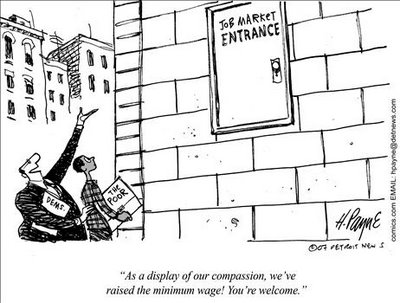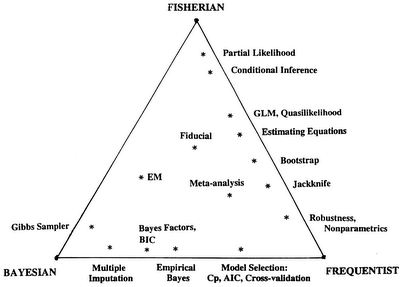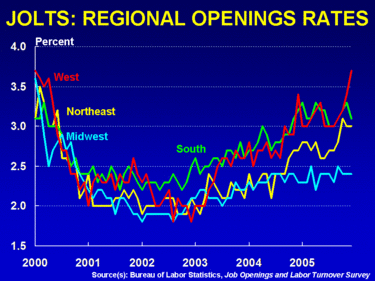A picture sometimes is worth a thousand words.
2) Greg Mankiw points to this dcoumentary on Milton Friedman:
On January 29, PBS will broadcast The Power of Choice, a documentary about Milton Friedman. Here is a preview.
3) Does Politics Reflect Personality a post by Tyler Cowen:
- Liberals are messier than conservatives. Their rooms have more clutter, more color. Conservatives’ rooms are better organized, more brightly lit, and more conventional. Liberals have more books and their books are on a greater variety of topics.
- Compared to liberals, conservatives are less tolerant of ambiguity, a trait researchers say is exemplified when George Bush says things like, "Look, my job isn't to try to nuance. My job is to tell people what I think," and "I'm the decider."
- Conservatives have a greater fear of death.
- Liberals are higher on openness, which includes intellectual curiosity, excitement-seeking, novelty, creativity for its own sake, and a craving for stimulation like travel, color, art, music, and literature.
- Conservatives are higher on conscientiousness, which includes neatness, rule-following, duty, and orderliness.
- Conservatives have a greater need to reach a decision quickly and stick to it.
- When people are prompted to think about death—a state of mind psychologists call mortality salience—they actually become more conservative.
- Conservatives are more likely to have been insecure as kids, whereas liberals are more likely to have been confident as kids.
4) Web Trials by Seth Roberts:
I recently asked Robin Hanson, a professor at George Mason University, what he thought of web trials. Web trials are a way to learn how to solve difficult health problems (e.g., acne, obesity). By web trial I mean a web-based collection of data that compares different ways of solving a problem. People with the problem would go to a website, sign up for one of the treatments, follow the directions, and report the results in a standardized format.
I asked Robin because he has pioneered a similar improvement: Prediction markets are often far better than what they replace.
Here is a summary of what he said.
- 1. A selection effect is a big concern.
- 2. How could you get people to allow you (the website) to choose for them which treatment to do?
- 3. It doesn’t have to be restricted to health problems.
- 4. Perhaps you could get people to commit to this the way they do to Wikipedia.
5) Tyler Cowen rates how he thinks national healthcare would do:
Let's rate "the paper clip industry" as a 9 out of 10. Paper clips are pretty cheap and usually they work. Let's rate the better federal agencies as a 6.5 out of 10. Let's rate HUD as a 2.5 out of ten.
How will national health insurance do, keeping in mind that U.S. doctors do not wish to have their wages cut, Americans want the right to choose their doctors, and the U.S. is a huge, messy, decentralized, federalistic country with lots of cheats and massive, hard-to-eradicate inequalities at many different levels.
I give it about a 3. How about you?
6) Steve Postrel asks How Does Management Affect Capabilities?
What contribution does management make toward producing output? If you watch Federal Express commercials, or read Dilbert, or listen to many technical workers when they talk to each other, the answer is “nothing.” Management is seen as purely an obstruction to the accomplishment of useful work.
If we take “management” as a sociological category, denoting a set of pointy-haired individuals disconnected from actual technical problem solving, then one could perhaps defend this position. But if we think of “management” as a collection of activities and practices, those practices seem essential, and many people, from computer programmers to chemists to special effects wizards, engage in them. But just how does management increase output?
7) Aleks posts this interesting distribution of statistical techniques:
I wish I knew what half of those things meant!
8) Nature Gives Up on Open-Source Peer Review by Peter Klein:
The open-source, wiki model does not, apparently, work well for scientific publishing. Nature had placed a selection of submitted manuscripts online and invited feedback from researchers around the world, promising to take the feedback into consideration as part of the formal review process. But the scientific community showed little interest. Few authors were willing to participate in the experiement, and the online papers didn’t get much feedback.

10) Online Lecture Notes from econphd.net:
Selective listing of graduate-level course notes in all core disciplines.
I should have tracked this down sooner!
Yesterday the Bureau of Labor Statistics released the latest information (through November) from its Job Openings and Labor Turnover Survey (JOLTS) and, being a firmly ensconced denizen of fly-over land, this information caught my eye:
12) The Global Poor Are Getting Richer Faster by James Peron:
Only two decades ago the poor nations provided only 14 percent of wealthy nations' manufactured imports. Today they provide 40 percent and by 2030 they are projected to provide over 65 percent.
As it was over the last 25 years it is the poor who will benefit the most. "The number of people living on less than $1 a day [in constant dollars] could be cut in half, from 1.1 billion now to 550 million in 2030." And the number living on less than $2 per day will decline by an estimated 800 million.
This will happen in spite of a growing world population, though growth levels will be much slower than today. The population growth rate, which was around 1.7 percent in the 1980s will decline to 1 percent by 2015 and to 0.7 percent in 2030.



No comments:
Post a Comment